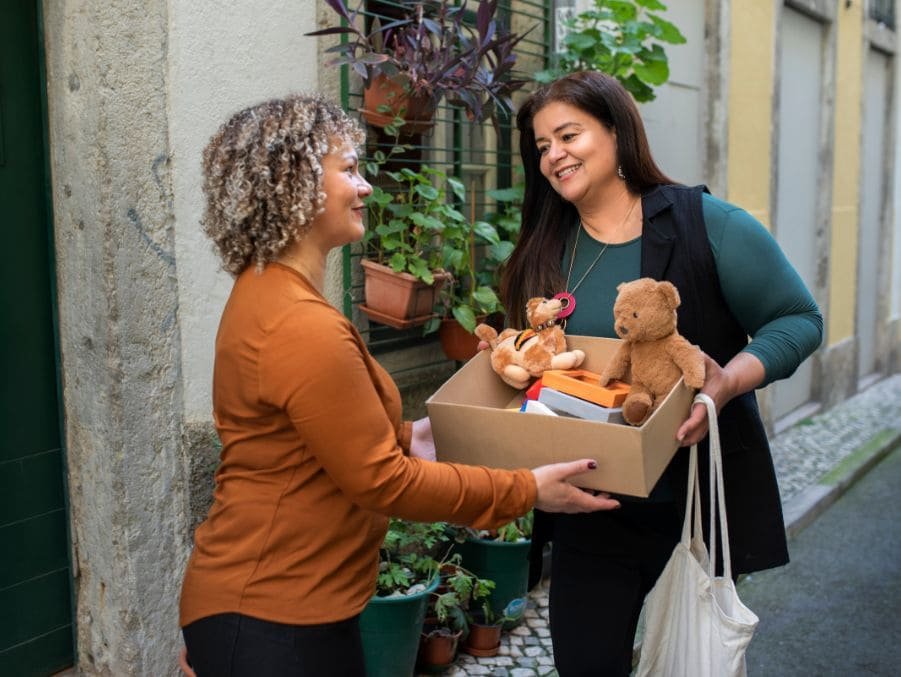The pandemic has desensitized a majority of the population across the globe, many just don’t care anymore. We spent almost 2 years isolated, only connected through social media. Unfortunately, while social media helped us stay connected, it also created a sense of apathy, especially among young adults and teenagers. Spending most of our time in isolation made us forget how good kindness and compassion feel. As we all know, humans are social beings.
Countries and races may separate us, but kindness unites us as humans. Kindness has a universal appeal, not just to humans, but also to animals. It is a trait inherent to all of us (Karlin & Ozawa-de Silva, n.d.). Jog your memory and try to recall the initial important lessons that our parents and teachers tried to instil in us since day one. Chances are that the first thing that came into your mind was “Be nice to everyone”. Now recall the warmth you feel when someone compliments you or gifts you flowers for no apparent cause except to appreciate you.
Close your eyes and visualise the dazzling smile on your friend’s face when you complimented their clothes or just were there for them when they needed you. It feels good, right? The above examples perfectly align with the characteristics of what we define as a nice person. When we think of a nice person, we usually think of people who are friendly, considerate, and kind to others. They usually have a high level of empathy and are sensitive to the needs of others. Some people are born nicer than others, but it is a trait that everyone can develop.
According to Clinical Psychologist Tanya Anand, “Be respectful just the way you would want others to be towards you- what goes around comes around. Take other people’s perspectives. Step into their shoes to try and understand what they may be going through or what their situation is like. Communicate using positive or neutral words instead of critical language or blaming statements. Bring in gratitude appreciation and acknowledgement towards people around you.” Assume benevolence, it will help you build trusting and meaningful relationships. People are not out there to get you. Find time and opportunity for prosocial work. Help people around you in their time of need or in a meaningful way. Be compassionate and empathetic towards yourself. It will enable you to do so for your loved ones as well” says Tanya.
Benefits Of Being a Nice Person:
Nice people not only make others happy but also find inner peace and a sense of fulfilment from seeing others happy. Here are some reasons you should aim to be a nice person:
- Improved Relationships: Empathy and understanding are the keys to a fulfilling and healthy relationship. Small gestures of kindness can add warmth and depth to your relationships, making your loved ones feel appreciated.
- Increased Life Satisfaction: Being nice to others can help you feel content with your own life as well. It increases your ability to adapt and adjust to whatever life might throw at you.
- Social Integration: When you give love, you receive love, while it may not always be true, it is often the case. Nice people find it easier to integrate into society, as they tend to adhere to social norms and avoid antisocial behaviour.
- Teamwork is Dreamwork: Nice and empathetic individuals find it easier to work in teams. Nowadays, most colleges and workplace organizations require us to coordinate with others and work in teams. Being kind and understanding lifts a huge burden from the shoulders of both parties.
- Lower Emphasis on Results: The journey is often more important than the result. However, in today’s world, it’s hard to focus on the lessons we learned instead of the outcome. Nice people often find it easier to be lenient on themselves and others and focus on the journey instead of the end goal (Whitbourne, 2023).
Seven Ways To Be A Nicer Person
1. Think Before Speaking
We all get negative or rude thoughts and opinions about others from time to time. It is important to acknowledge and understand your thoughts but avoid sharing them. Initially, you may find it hard to keep your harsh judgments to yourself, but with practice, soon you will find peace in it. Before sharing a negative opinion about another person, ask yourself, “Is it something that can be changed in under five minutes?” If not, don’t say it out loud, and remind yourself that everyone has a different perspective on life (Schanzer, 2021).
2. Be Nice To Yourself
To pour love, you need to fill yourself with it first. The way we talk to ourselves also reflects on how we talk to others. If a person is harsh towards themselves they might also often find themselves being equally harsh to others. Self-talk eventually starts creeping into our speaking habits, often leading to the projection of our feelings onto others. Practice being nice to yourself and you will start to find that being nice to others is not that hard.
3. Practice Gratitude
Whether it was a productive day or not, by the end of the day we are all drained and exhausted. This exhaustion leads to bitterness about the world which results in bitterness towards other people including our loved ones. Every night try to take five minutes before sleeping and list down at least six things you are grateful for. If you are a morning person try doing this as soon as you wake up and soon you will notice feeling more energized and ready to tackle the day.
4. Practice Forgiveness
It is not easy to forgive those who have made our lives a bit darker than it was. However, the more you hold on the darker it will become. Eventually, this darkness would start to spread not only inside yourself but also to people who did nothing wrong. Letting go of past resentments can help you move on from the past and feel more hopeful for the future (Cherry, 2021).
Read More: Forgiveness – The Golden Virtue
5. Be Open-minded
It is a hard pill to swallow but there is no ultimate correct way to live a good life. When we see people with opinions different from ours it is natural to feel negative and even threatened. We often are raised to believe that our values are right and others are wrong. Yet, if you look deeper then, every person, culture or country feels the same that they are right and outsiders are wrong. It is important to acknowledge and be open to absorbing and expanding our knowledge. To become a nice person it is important to accept that not everyone has the same views about the world as us.

6. Perform One Act Of Kindness Everyday
Due to the fast-paced nature of our current lives, even the thought of being kind can be overwhelming. We are so occupied with our own lives and work that we forget that others might be equally exhausted. Try to perform at least one act of kindness every day, it does not have to be back-breaking to be impactful. On a good day, it could be volunteering on an exhausting one it could just be checking in with your coworkers and complimenting them. These actions may seem small at first but are a big step toward bringing about a change in the world (Ashley, 2023).
7. Listen Actively
There are days when we feel as if the sky is suddenly crashing down or that nothing is going right, but often an empathetic shoulder to cry on is what we need to bounce back. Be that empathetic shoulder for someone. Just listening and paying attention to what the other is saying can have a powerful impact on the person and it might even make their day. Actively listening is the first step to becoming a nicer person who people can lean on.
Read More: How to enhance the skill of Active Listening and use it for Self Help?
Human beings are inherently empathetic and kind creatures. Everyone can be kind and change the world to be a nicer place to live in. The COVID-19 pandemic drastically changed our lives including how we perceive kindness. Always remember that being kind is the bravest thing one can do especially in our current society.
While being a nice person is important, it is also necessary to keep in mind that this kindness should not affect your well-being. If you feel overwhelmed from consistently being there for others take a step back and take time to be nice to yourself. With practice being nice becomes a rewarding habit that makes the world a brighter place for both you and others to live.
According to Clinical Psychologist Megha Jain, being a nice person means you don’t have to constantly think about being hurtful, seeking revenge, or being distasteful to others. Being nice is much easier than being hurtful because being hurtful requires strategizing. In contrast, being nice allows you to be natural and easy in your most authentic form.
FAQs
1. What makes a person very nice?
Nice people are usually defined as friendly, considerate and compassionate individuals. They tend to treat everyone with respect, regardless of differences. Nice people are usually open-minded and empathetic people who find happiness in helping others.
2. How do I become nice again?
The journey to becoming nice again starts by taking a look inside and acknowledging that despite the circumstances, it is important to take accountability for your words and actions. Start by giving at least one compliment to yourself and others every day and slowly stepping up back to being the kind and compassionate person you earlier were.
3. Why do I struggle to be nice?
The inability to be kind to others often stems from low self-esteem and negative self-talk. It is impossible to be nice to others if you are not nice to yourself. Start by developing self-compassion and eventually, you will find your resentment towards others simmer down. Practice active listening, smiling and eye contact during interactions.
4. How to speak nicer?
The first step to speaking nicer is to listen and understand what the person is saying. Use polite and diplomatic language to avoid intimidating or hurting the other person. Avoid using negative words and instead, frame them using positive words to lessen the harshness of the sentence. Incorporate thank you and sorry in your language whenever you can.
References +
- Ashley. (2023, February 20). 7 Tips to be a Nicer Person (and Build Better Relationships). Tracking Happiness. https://www.trackinghappiness.com/how-to-be-nicer
- Cherry, k. (2021, November 29). 6 Ways to Become a Nicer Person. Verywell Mind. https://www.verywellmind.com/6-ways-to-become-a-nicer-person-5194074 3.
- Karlin, M., & OZAWA-DE SILVA, B. The Science, Theory and Practice of Kindness: A Brief Overview. (n.d.). UNESCO MGIEP. https://mgiep.unesco.org/article/the-science-theory-and-practice-of-kindness-a-brief-over view
- Schanzer, S. (2021, January 20). Established California | 7 Ways to Be A Nicer Person. Established California. https://www.establishedcalifornia.com/estca/7-ways-to-be-a-nicer-person
- Whitebourne, S. K. (2023, February 20). Kindness does wonders for your well-being, and others’. Psychology Today. https://www.psychologytoday.com/us/blog/fulfillment-at-any-age/202211/8-benefits-of-being-a-nice-person













Leave feedback about this